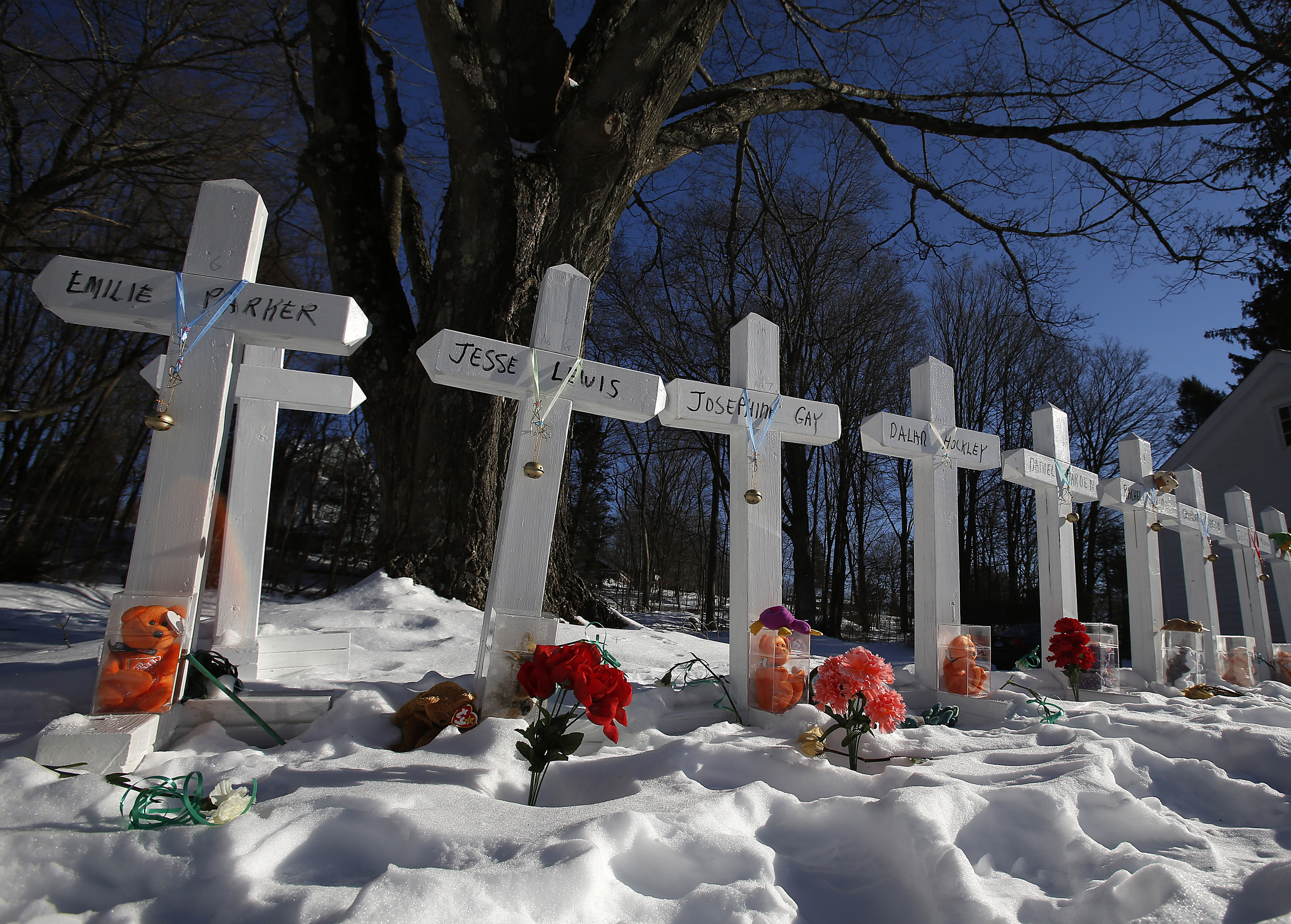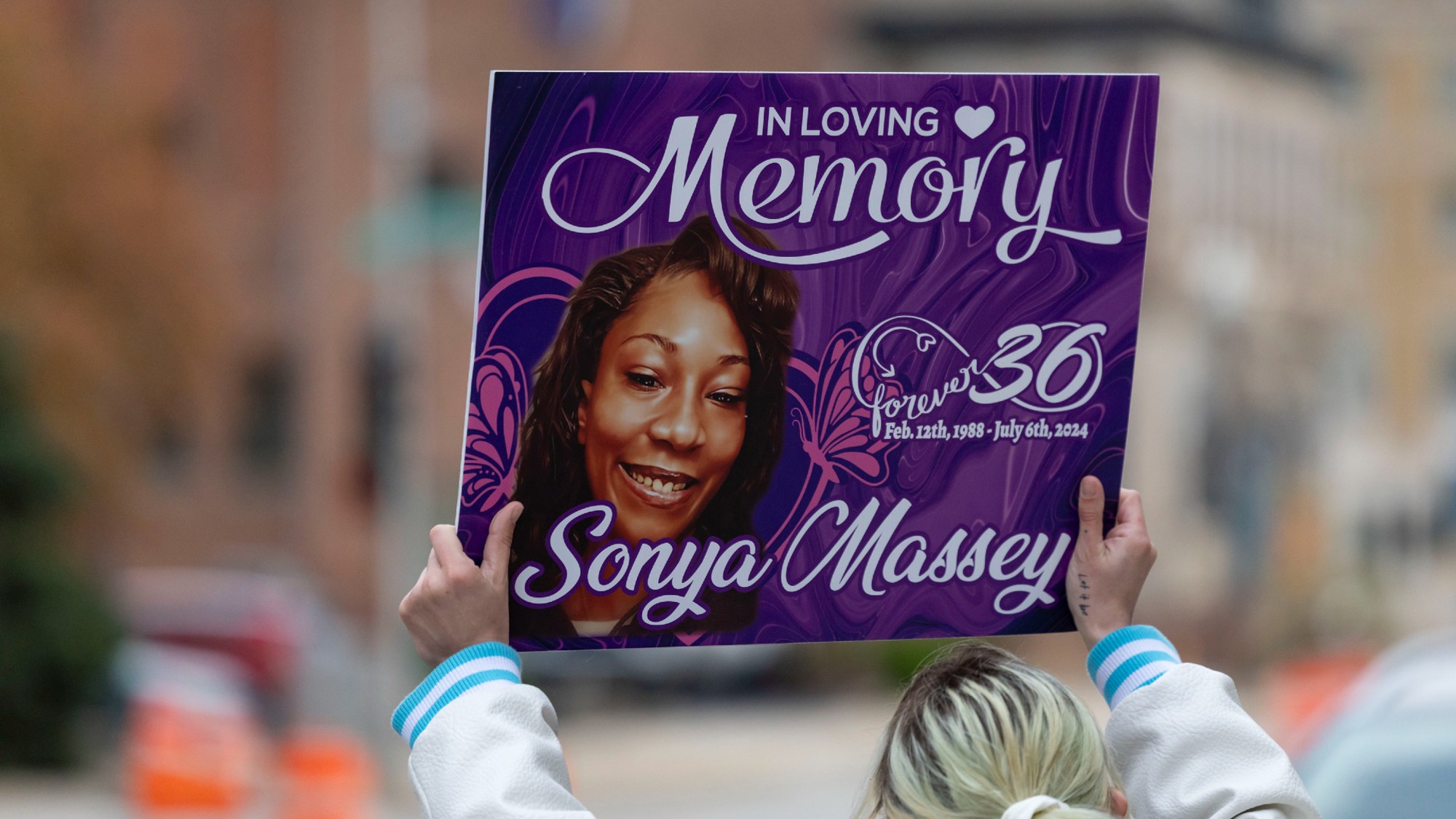Exposing the Sandy Hook hoaxers
Lenny Pozner used to believe in conspiracy theories — until his son's murder became one. Now he's taking on the people who say the Sandy Hook massacre never happened.

On December 14, 2012, Lenny Pozner dropped off his three children, Sophia, Arielle, and Noah, at Sandy Hook Elementary School in Newtown, Connecticut. Noah had recently turned 6, and on the drive over they listened to his favorite song, "Gangnam Style," for what turned out to be the last time. Half an hour later, while Sophia and Arielle hid nearby, Adam Lanza walked into Noah's first-grade class with an AR-15 rifle. Noah was the youngest of the 20 children and seven adults killed in one of the deadliest shootings in American history. When the medical examiner found Noah lying face up in a Batman sweatshirt, his jaw had been blown off.
It didn't take long for Pozner to find out that many people didn't believe his son had died or even that he had lived at all. Days after the rampage, a man walked around Newtown filming a video in which he declared that the massacre had been staged by "New World Order global elitists" intent on taking away our guns. A week later, James Tracy, a professor at Florida Atlantic University, wrote a blog expressing doubts about the massacre. By January, a 30-minute YouTube video titled "The Sandy Hook Shooting — Fully Exposed," which asked questions like "Wouldn't frantic kids be a difficult target to hit?" had been viewed more than 10 million times.
As the families grieved, conspiracy theorists began to press their case in ways that Newtown couldn't avoid. State officials received anonymous phone calls at their homes, late at night, demanding answers: Why were there no trauma helicopters? What happened to the initial reports of a second shooter? A Virginia man stole playground signs memorializing two of the victims, then called their parents to say that the burglary shouldn't affect them, since their children had never existed. At one point, Pozner was checking into a hotel out of town when the clerk looked up from his driver's license and said, "Oh, Sandy Hook — the government did that."
The Week
Escape your echo chamber. Get the facts behind the news, plus analysis from multiple perspectives.

Sign up for The Week's Free Newsletters
From our morning news briefing to a weekly Good News Newsletter, get the best of The Week delivered directly to your inbox.
From our morning news briefing to a weekly Good News Newsletter, get the best of The Week delivered directly to your inbox.
Lenny and Veronique Pozner moved to Newtown in 2005, partly to send their kids to better schools, but after Noah's death they saw no choice but to leave. "What happened just weighed on the town like a Chernobyl-like cloud," Veronique told me from her home in a state far from Newtown that the Pozners prefer not to identify, given the threats that conspiracy theorists have leveled against some Sandy Hook families. The Pozners' marriage had been falling apart before the shooting, and though Noah's death briefly brought them back together, the couple eventually divorced.
Lenny lives by himself a few miles from Veronique. Since relocating, he has moved apartments four times and gets his mail delivered to a P.O. box on the other side of the state.
There is no universal Sandy Hook hoax narrative, but the theories generally center on the idea that a powerful force (the Obama administration, gun-control groups, the Illuminati) staged the shooting, with the assistance of paid "crisis actors," including the Pozners, other Sandy Hook families, and countless government officials and media outlets. The children are said to have never existed or to be living in an elaborate witness-protection program.
Lenny may have been the first Newtown parent to discover that conspiracy theorists didn't believe his son had been killed, because he used to be a serious conspiracy theorist himself. "I probably listened to an Alex Jones podcast after I dropped the kids off at school that morning," Pozner said, referencing the fearmongering proprietor of InfoWars. Pozner had entertained everything from specific cover-ups (the moon landing was faked) to geopolitical intrigue (the "real" reasons why the price of gold sometimes shifts so dramatically), and saw value in skepticism. For him, the appeal of conspiracy theories was the same as that of a good science-fiction movie. "I have an imaginative mind," he said.
A free daily email with the biggest news stories of the day – and the best features from TheWeek.com
Lenny had worked for two decades as an IT consultant, but after Noah was killed, he found the crisis management that the job required to be overwhelming. In the year after Noah's death, Lenny's mother died, and he and Veronique separated. "People tell me it's supposed to get easier," Lenny said on the shooting's first anniversary. "We're waiting for that to happen."
But in the spring of 2014, as he watched the hoaxer movement bloom, Pozner decided to try fighting back. He released Noah's death certificate, to convince those who believed he had not been killed, and his report card — "Noah is a bright, inquisitive boy" — for those who believed he had never lived at all. One Friday night, a year and a half after the shooting, he joined a Facebook group called Sandy Hook Hoax, one of the more prominent hoaxer meeting grounds. Pozner told the group he was there to answer questions, and he expressed his empathy with their mind-set. "I used to argue with people about 9/11 being an inside job," he wrote. Some members of the group asked earnest questions about inconsistencies in the official account. Others simply lobbed bombs. Pozner chatted for more than four hours, but his patience wore thin as the questions grew more absurd.
Pozner was kicked out of the group, but several people contacted him with more questions. "All they know is what they're seeing online," Pozner said, "the buzz of all of this disinformation." Pozner had found his mission, and the next day he started a group called Conspiracy Theorists Anonymous, dedicated to debunking hoaxer theories.
He also took his fight public, writing an op-ed in The Hartford Courant in which he called out hoaxers by name, including Wolfgang Halbig, a 70-year-old retired school administrator in Florida. Halbig had become the hoaxers' lead investigator, filing Freedom of Information Act requests for documents relating to the shooting and posting his findings on a website called Sandy Hook Justice Report. In May 2014, Halbig spoke at a public meeting of the Newtown Board of Education. "These are your children," Halbig told the board, which sat in silence. "We want truth."
After the meeting, Pozner emailed Halbig saying that he'd like to talk to him. Halbig didn't respond, but Pozner says another hoaxer sent a reply: "Wolfgang does not wish to speak with you unless you exhume Noah's body and prove to the world you lost your son."
Halbig lives 45 minutes northwest of Orlando in a gated golf-course community. Halbig says that, initially, Sandy Hook horrified him. He had worked in school security for a number of years, and it was only after he was asked to give a presentation to the Florida School Boards Association about preventing such an attack that he began seriously investigating the shooting.
Two months after Sandy Hook, Halbig sent an email to an employee of the Newtown school district suggesting that the full story of the massacre had not been told and offering his services as a school-safety consultant to investigate. The board, flooded with such emails, never responded, which Halbig took as an affront. He began making FOIA requests and peppering people in Newtown with questions. In one email, he asked Sally Cox, the school's nurse, who hid in a closet when Lanza opened fire, "Why close your eyes when you have seen blood before?"
Not long after he emailed Cox, Halbig says, two Florida police officers visited his home to relay a message from police in Connecticut that he risked being charged with harassment if he continued contacting people in Newtown. The incident made him a celebrity in the hoaxer world: Here was a real example, they believed, of the authorities trying to silence their investigation.
Halbig was far from the only active hoaxer. In 2015, James Tracy, the Florida Atlantic University communications professor, sent a letter to the Pozners demanding proof that they were Noah's parents, and James Fetzer, an emeritus professor at the University of Minnesota, published a book called Nobody Died at Sandy Hook. In November, at a memorial run honoring Vicki Soto, a teacher killed at Sandy Hook, a Brooklyn man named Matthew Mills walked up to Soto's sister, wearing an official T-shirt from the run, and demanded that she tell him whether a family photo had been photoshopped to include Vicki, whom he believed didn't exist.
But Halbig has been the most persistent, and over the past two years, he has gone to Connecticut more than 20 times to examine documents, speak at public meetings, and attend hearings. The investigation has been financially costly to both sides. Halbig says he has raised more than $100,000 from supporters through fundraising sites, while state and local governments have had to devote significant resources to dealing with his visits and ceaseless document requests.
"This is my adventure," Halbig told me in July at a diner in Newtown. Halbig was in town to review insurance claims he had requested, hoping they would show there had been no actual damage done by the shooting. By this point, he had narrowed his 16 main questions for authorities to five. "The questions that I'm asking, they're not disrespectful to the families," Halbig said. "This is my big one — who ordered the port-a-potties?" The vast conspiracy could be cracked, Halbig believed, if he could prove that toilets brought to the scene after the shooting had not been delivered by a local port-a-potty company hoping to be useful during a tragedy but had instead been ordered in preparation for a staged event.
If the hoaxers were going to make Pozner's life even more of a hell than it had become when his son was killed, he might as well make their life hell too. He filed a complaint with the Florida attorney general against Halbig and built a website on which he posted the personal information of various hoaxers. Last November, the HONR Network, an organization Pozner established in 2015 to take down online hoaxer content, published The Hoax of a Lifetime, a 165-page ebook that treated Halbig's life, much as Halbig had treated Pozner's, as a hoax to be exposed. The book noted inconsistencies in Halbig's record, pulled out salacious details from his personal life, and demanded that he answer the types of trivial questions he had been asking people in Newtown, like one asking why his wife's name appeared with a different middle initial on several documents. The trolled had become the troll.
Pozner knew that by prodding the hoaxers, he had perhaps brought more vitriol upon himself. But he denied kicking a hornet's nest. "People don't understand what trolls are," he said. "If you don't feed them, they don't just go away."
One day, in Newtown, I was sitting in a Starbucks when a middle-aged man — he asked me to refer to him by his email handle, Vlad the Impaler — walked up and told me he was part of a group of Newtown men, mostly fathers, who have taken it upon themselves to keep track of the hoaxers. None of the 18 men had lost a child in Newtown, and they weren't in touch with Pozner, but Vlad said that he and many others privately supported Pozner's crusade.
Vlad said he felt that Newtown had been too polite in dealing with the hoaxers, and there was also part of him that found satisfaction in being able to retaliate. The only viable strategy, he believed, was to disrupt the hoaxers' lives. In March, a friend of Vlad's sent Halbig an email from realivankatrump@gmail.com, inviting him to a meeting at Mar-a-Lago where he could present the findings of his investigation for possible use in the campaign. Halbig, who is a Trump supporter, drove three hours to Palm Beach only to be turned away by confused security.
By late August, however, it was unclear whether Halbig's campaign would last much longer. After another FOIA hearing in Hartford, in which he unsuccessfully demanded the release of police dash-camera videos, Halbig lost his temper and said he was prepared to go to jail. His sit-in lasted 70 seconds, but he seemed distraught. "You have to understand — my family, they can't even go to work anymore," Halbig said. "They're scared to death." For several weeks, Vlad had been sending anonymous emails to Halbig's wife and sons and their employers, insisting that they were complicit in his harassment of grieving families. It was the first time anyone from Newtown had reached out to Halbig's family, and a few days later, Halbig shut down his website.
But Pozner was skeptical that Halbig would truly go away. The hoaxer problem was one the victims of tragedy would be dealing with well into the future: When I visited Halbig in June, just after the Pulse shooting in Orlando, he pulled up a blueprint of the club and asked why no security footage had been released. "It's the same players, the same method," Pozner said of the conspiracy theories that now erupt after every tragedy. "The hoax thing is like a brush fire."
Excerpted from an article that originally appeared in New York magazine. Reprinted with permission.
-
 ‘Something close to a universal rallying cry’
‘Something close to a universal rallying cry’Instant Opinion Opinion, comment and editorials of the day
-
 Trump sues IRS for $10B over tax record leaks
Trump sues IRS for $10B over tax record leaksSpeed Read The president is claiming ‘reputational and financial harm’ from leaks of his tax information between 2018 and 2020
-
 Ex-Illinois deputy gets 20 years for Massey murder
Ex-Illinois deputy gets 20 years for Massey murderSpeed Read Sean Grayson was sentenced for the 2024 killing of Sonya Massey